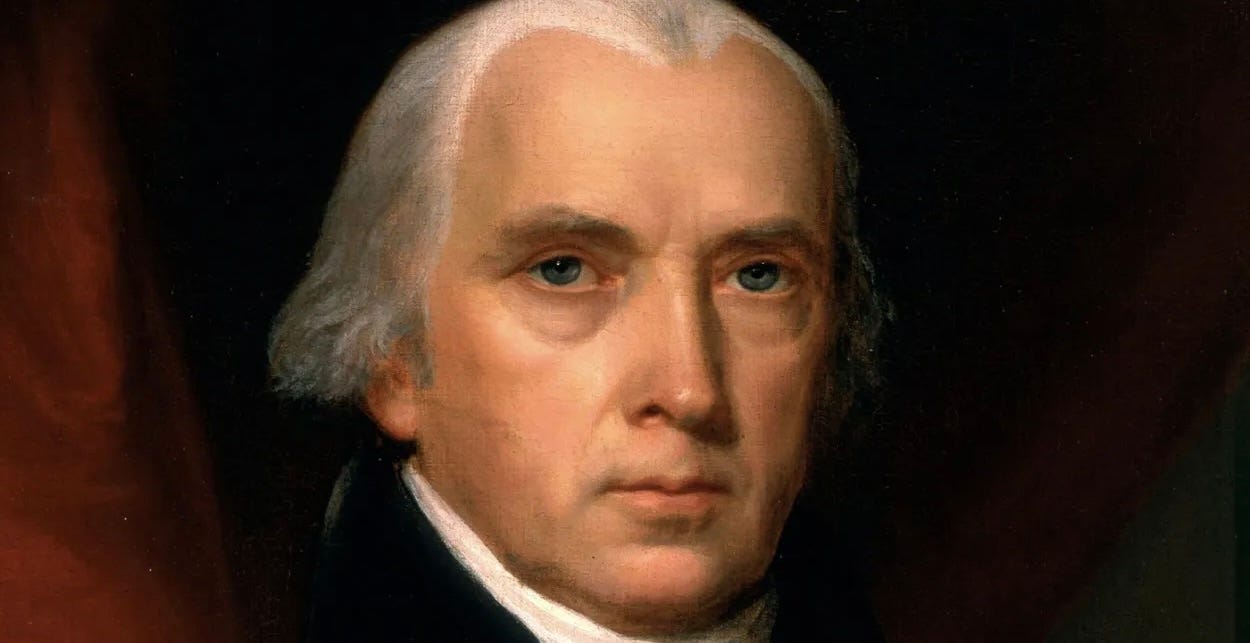James Madison had changed his mind before. More than once, in fact, and on the same subject—namely the legitimate powers of the federal government. Madison had spearheaded the campaign to replace the state-centric system of the Articles of Confederation with the federal-first Constitution of 1787. He led the successful ratification effort, co-authoring the Federalist Papers with Alexander Hamilton and John Jay. He initially opposed adding a bill of rights to the Constitution, believing such constraints on the federal government were unwarranted and inadvisable. But he was persuaded that a bill of rights was politically essential to ratification, and, taking upon himself the drafting of the bill of rights, he concluded that it was actually a good idea.
The new government hadn’t been operating long before Madison wondered if it had shifted too much power to the central government. When Hamilton, as George Washington’s treasury secretary, unveiled a grand scheme of centralization in finance and economics, Madison objected. He opposed Hamilton’s plan for a national bank, and after Congress approved a bill embodying Hamilton’s plan, he urged Washington to veto it. He drafted a veto message that explained his thinking and, he hoped, Washington’s. “I object to the Bill because it is an essential principle of the Government that powers not delegated by the Constitution cannot be rightfully exercised; because the power proposed by the Bill to be received is not expressly delegated; and because I cannot satisfy myself that it results from any express power by fair and safe rules of implication.”
Washington sided with Hamilton and signed the bank bill. Madison moved on, allying with Thomas Jefferson to create the Republican party, which had the purpose of restraining the party gathered around Hamilton, the Federalists. Madison and Jefferson collaborated in protesting the Alien and Sedition Acts of 1798, which granted the federal government excessive power to stifle dissent, they thought. The alarm they raised helped overthrow the Federalists in the elections of 1800 and elevated Jefferson to the presidency.
Jefferson proceeded to position Madison to be president upon Jefferson's retirement. The arrangement worked, and Madison took over in 1809. He inherited Hamilton's national bank, the Bank of the United States, of which he still disapproved. But he took no action, for the bank's charter ran only until 1811. On schedule, the bank died, to Madison's satisfaction.
Not long after it did, however, the United States went to war against Britain. The war required raising human and material resources in all of the states, and transporting them to the theaters of fighting. Madison suddenly came to appreciate the value of a single bank operating in all the states, under the auspices of the federal government.
Reversing his longstanding position, with which he was firmly identified in public, Madison recommended to Congress the re-creation of the national bank.
But Congress moved slowly, and before it could act, the war ended. Madison declined to press the issue against the advocates of state banks who didn't look kindly on the resurrection of the national banking monopoly.
Conversion from war to peace is often fraught with difficulty and economic hazard. So it was after the War of 1812. Amid the tumult and distress, Madison concluded that the nation's monetary system required a steadying influence. “If the operation of the State Banks cannot produce this result, the probable operation of a National Bank will merit consideration,” he declared in his annual message in December 1815.
This time Congress took Madison's advice. In April 1816 he signed a bill creating the second Bank of the United States.
The change of heart experienced by Madison wasn't shared by all in his party. The Federalists had fallen into disarray after the War of 1812, leaving the field to the Republicans, but that party factionalized, with the strongest group gathering behind Andrew Jackson, elected president in 1828. Jackson, a Tennessean, distrusted banks, and the bigger they were the more he distrusted them. The second Bank’s charter would run to 1836; much like Madison earlier, Jackson was willing to let it die a natural death. But Kentuckian Henry Clay, eager to defeat Jackson for president in 1832, got Congress to approve early renewal of the charter. Jackson vetoed the renewal and trounced Clay in the election.
The American financial system stumbled along without a central bank for eight decades, until the creation of the Federal Reserve in 1913.

